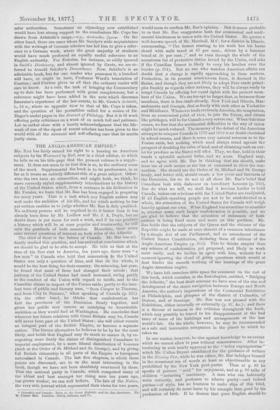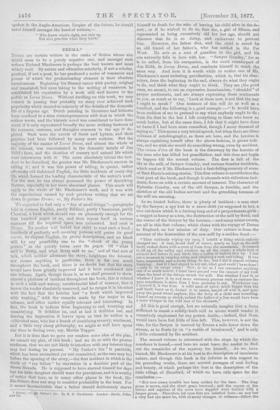THE ANGLO-AMERICAN EMPIRE.*
Mn. RAE has fairly earned his right to a hearing on American subjects by his Westward by flail, now in a third edition, to which he tells us on his title-page that the present volume is a supple- ment. It does not seem to us that this is so, in the ordinary sense of the word. Supplemental the book is to its predecessor, in so far as it treats an entirely different side of n great subject. Other- wise the two have no connection, and might both, we think, be more correctly styled supplementary introductions to the history of the United States, which, from a sentence in his dedication to Mr. Forster, we learn that Mr. Rae has been engaged in preparing for many years. That is a task which any English author may well make the ambition of his life, and for which nothing he has yet written enables us to judge whether Mr. Rae is duly qualified. No ordinary powers will be required to do it better than it has already been done by Mr. Ludlow and Mr. J. A. Doyle, but no doubt there is yet room for such a work, and if he can produce a history which will be at once popular and trustworthy, he will earn the gratitude of both countries. Meantime, these notes raise several questions of interest on both sides of the Atlantic.
The chief of these is the future of Canada. Mr. Rae has evi- dently studied this question, and has arrived at conclusions which we should be glad to be able to accept. He tells us that at the time of his first visit to America, ten years ago, there were "a few men" in Canada who held that annexation to the United States was only a question of time, and that on the whole, it would be the best thing for their country. On returning, last year, he found that most of these had changed their minds ; that jealousy of the United States had much increased, owing partly to the conduct of the Union with regard to tariffs, and to the Canadian claims in respect of the Fenian raids ; partly to the inso- lent tone of public and literary men, "from Cooper to Thoreau, and from Clay to Sumner," when speaking of Canada (p. 225). On the other hand, he thinks that confederation has knit the provinces of the Dominion firmly together, and given her public men careers as satisfying to honourable ambition as they would find at Washington. He concludes that whatever her future relations with Great Britain may be, Canada will never form part of the United States ; she will either remain an integral part of the British Empire, or become a separate nation. The former alternative he believes to be by far the most likely, and holds that England may do much to ensure it, by re- cognising more freely the claims of distinguished Canadians to imperial employment, by a more liberal distribution of honours (such as the Order of St. Michael and St. George), and by giving full British citizenship in all parts of the Empire to foreigners naturalised in Canada. The last five chapters, in which these points are discussed, are to us the most interesting in the book, though we have not been absolutely convinced by them. That the national party in Canada, which comprised many of the ablest and best amongst her rising men ten years ago, has grown weaker, we can well believe. The fate of the Nation, the very able journal which represented their views for two years,
* Columbia and Canada: Notes on the Great ReAblic and the Nets Dominion. By W. Framer Rao. London: Dolly, Isblotor, and Glo.
would seem to confirm Mr. Rae's opinion. But it seems probable to us that Mr. Rae exaggerates both the economical and senti- mental hindrances to union with the United States. He quotes a well-known speech of Mr. Marshall, M.C. for a district in Illinois, commencing, "The farmer starting to his work has his horse shoed with nails taxed at 67 per cent., driven by a hammer taxed at 50 per cent. ;" and so runs through the whole of the monstrous list of protective duties levied by the Union, and asks if the Canadian farmer is likely to envy his brother over the border (p. 234). But no one who watches American affairs can doubt that a change is rapidly approaching in these matters. Protection, in its present mischievous form, is doomed in the States, and though they are not likely to adopt Free-trade princi- ples frankly as regards other nations, they will be always ready to tempt Canada by offering her equal rights with the present mem- bers of the Union. We are too apt to forget that, as between these members, there is free-trade already. New York and Illinois, Mas- sachusetts and Georgia, deal as freely with each other as Yorkshire and Middlesex. Whenever trade revives in America, the temptation, from an economical point of view, to join the Union, and obtain like privileges, will be for Canada a very severe one. When that time comes, we fear that the sentimental difficulties in the way of union might be much reduced. The memory of the defeat of the American attempts to conquer Canada in 1776 and1812 is no doubt cherished in school-rooms, and there is some very natural soreness as to the Fenian raids, but nothing which need always stand against the prospect of doubling the value of land, and of obtaining suoli an out- let for produce as the States will offer. They, we fear, hold in their hands a splendid material bribe, and we none. England may, and we agree with Mr. Rae in thinking that she should, make freer use of such means as she has at command to rivet the con- nection. She should use the Order of St. Michael and St. George freely, and better still, should create a few peers and baronets of the Dominion, for we do not at all share Mr. Rae's belief that Canadians look with disfavour on hereditary honours (p. 245). But do what we will, we shall find it become harder to hold Canada, unless our relations with the United States are readjusted. If all English-speaking people are not to be confederated as a whole, the attraction of the United States for Canada will weigh heavily against our own. What England has meantime to consider is, whether some such larger confederation is possible, and we are glad to believe that the attention of statesmen Of both nations is being fixed more and more on this problem. Mr. Rae holds that the subjects of the Queen and the citizens of the Republic might be made at once sharers of a common inheritance by a simple Act of our Parliament, and an amendment of the United States Constitution, declaring them all citizens of the Anglo-American Empire (p. 313). This he thinks simpler than any scheme of confederation yet proposed, and likely to work more easily, and we incline to agree with him, without for a moment ignoring the cloud of gritty questions which would at first hinder the smooth working of the bearings of the great Anglo-American engine.
We have left ourselves little space for comment on the rest of this book, which contains, in the first chapter, entitled, "Bridging the Atlantic," the best short account we have seen of the rise and development of the steam navigation between Europe and North America, the author's impressions of the Centennial Exhibition at Philadelphia, and glimpses of the district of Columbia, of Boston, and of Saratoga. Mr. Rae was not pleased with the Exhibition, either internally or externally (p. 87, &c.) ; and there is a flavour of tartness in the criticism throughout the book, which may possibly be traced to his disappointment at the bad taste of some of the buildings and arrangements at the last world's fair. On the whole, however, he may be recommended as a safe and instructive companion in the places to which he takes us.
In one matter, however, he sins against knowledge to an extent which we cannot allow to pass without remonstrance. After in- troducing us with hearty approval to the "index expurgatorius " which Mr. Cullen Bryant established for the guidance of writers in the Evening Post, while he was editor, Mr. Rae indulges himself in the occasional use of words at least as objectionable as any prohibited by the New York poet-purist. Thus at p. 83 he speaks of persons " avid " for enjoyment, and at p. 96 talks of children " actuating " machinery. A man who can habitually write correctly, and professes to admire purity—and indeed purism—of style, has no business to make slips of this kind, and will certainly do more harm by his example than good by his profession of faith. If he desires that pure English should be spoken in the Anglo-American Empire of the future, he should enrol himself amongst the band of writers,—
" Who know what's right, not only so, But also practise what they know."







































 Previous page
Previous page